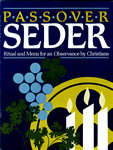
As one who was baptized into Christ in 1974 I want to emphasize that the Seder is not a Christian observance. It belongs to the Jewish tradition. In that form it is a historical, vivid, and beautiful expression of God's action for his people.
The Seder is one part of the present-day Jewish seven-day Passover celebration. The name Passover harks back to the time when God, through Moses, led the Israelites out of their slavery. The Egyptian pharaoh was finally convinced to let the people go when the angel of death killed every firstborn in Egypt but "passed over" the Israelite homes that had put lamb's blood on their doorposts.
To recall that great deliverance, the elements of the traditional Seder meal symbolize historically significant features of the Israelite experience. Both the event of God's deliverance and the directions God gave Moses for later commemoration of the Passover history are represented in the Seder ritual and meal.
Christians are particularly interested in this ritual meal because it was during a Passover celebration that Jesus instituted Holy Communion. It should be realized, however, that the Passover clearly predates and is entirely separate from the Eucharist. The Seder is a later Jewish form of the Passover observance, useful and important in its own right, having been practiced for more than 1,000 years. It must not be mixed with Christian concepts or expressions if it is to be authentic. It is a Jewish celebration of freedom useful in helping Christians understand Judaism.
Christians will want to avoid any tendency to syncretism, that is, mixing the Seder and the Lord's Supper so that the Seder appears to be a Christian observance. It is a Jewish ritual used to observe the Passover. The Lord's Supper is a Christian sacrament which was instituted by our Lord following a specific Passover observance.
Apart from its observance in the synagogue, Pesach, which is the Passover, has a unique place in the Jewish home because of the Seder and because of the changed atmosphere in the home during the seven days of celebration. The
atmosphere in the home is created each year by specific traditional practices. The home is carefully cleaned and scrubbed in all its parts, cooking vessels are made kosher, and all chametz (leavened bread, some foods, and ordinary dishes and cooking vessels) are removed or koshered (where possible) for the welcome of Pesach. Some foods are completely forbidden for use during Passover. Other
foods must carry the "Kosher for Passover" label with rabbinical signature. - From the Introduction